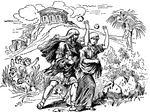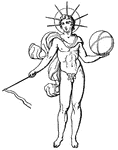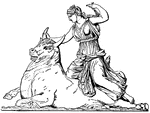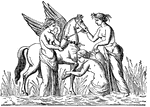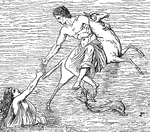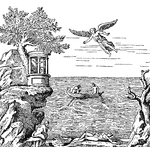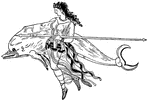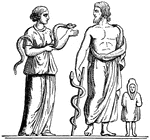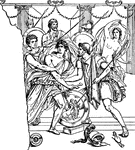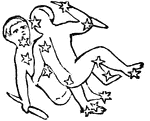
Gemini
"The third sign of the zodiac, so named from its 2 brightest stars, Castor, of the 1st magnitude, farthest…
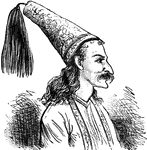
Greek
"The Greeks belong to the great Indo-European race, who from the earliest times have been the conquerers…
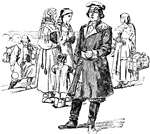
People of Odessa
"Odessa is the chief city of southern Russia, and men from all the countries about come here to trade."…
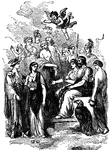
Pandora
"Epimetheus had in his house a jar in which were kept certain noxious articles, for which, in fitting…
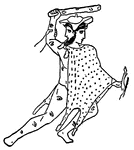
Argus
"Now Argus had a hundred eyes in his head, and never went to sleep with more than two at a time, so…
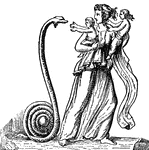
Leto or Latona
"The persecution which Latona experienced from Juno is alluded to in the story. The tradition was that…
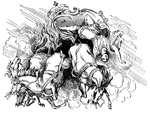
Phaethon
"Then Phaethon beheld the world on fire, and felt the heat intolerable. The air he breathed was like…
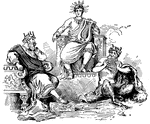
Midas
"Bacchus offered Midas his choice of a reward, whatever he might wish. He asked that whatever he might…

Pluto, Persephone, and Mercury
"Mercury was sent, accompanied by Spring, to demand Persephone of Pluto. The wily monarch consented,…
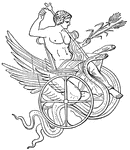
Triptolemus
"After his return Triptolemus built a magnificent temple to Ceres in Eleusis and established the worship…
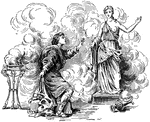
Pygmalion
"The story of Pygmalion and his statue is in all probability an allegory. Pygmalion was a virtuous and…

Apollo and Hyacinthus
"Apollo was passionately fond of a youth named Hyacinthus. He accompanied him in his sports, carried…

Iris
"Iris puts on her robe of many colors, and tingeing the sky with her bow, seeks the palace of the King…
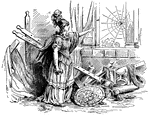
Minerva
"On Minerva's side Varro tells us that Cecrops found an olive tree and a fountain, and that on consulting…
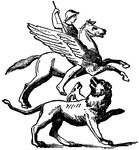
Bellerophon, Pegasus, and the Chimera
"After the conquest of the Chimaera, Bellerophon was exposed to further trials and labors by his unfriendly…

Centaur
"These monsters were represented as men from the head to the loins, while the remainder of the body…
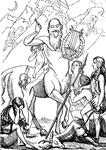
Chiron
"Chiron was instructed by Apollo and Diana, and was renowned for his skill in hunting, medicine, music,…
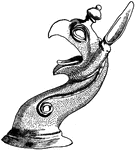
Gryphon
"The griffin is a monster with the body of a lion, the head and wings of an eagle, and back covered…
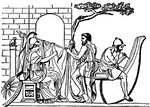
Building the Argo
"At that time the only species of navigation known to the Greeks consisted of small boats or canoes…

Hecate
"He promised her marriage, and as they stood before the alter of Hecate, called the goddess to witness…
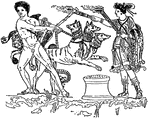
Hercules and Cerberus
"Hercules descended into Hades, accompanied by Mercury and Minerva. He obtained permission from Pluto…
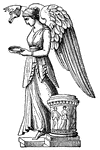
Hebe
"When once the mortal part of him has perished, Juno lays aside her enmity and marries him to Hebe,…

Ganymede
"Hebe was dismissed from her office in consequence of a fall which she met with one day when in attendance…

Theseus and the minotaur
"The Athenians were at that time in deep affiction on account of the tribute which they were forced…
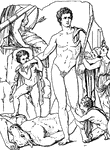
Theseus and the minotaur
"The Athenians were at that time in deep affiction on account of the tribute which they were forced…

The Dioscuri
"Castor and Pollux were the offspring of Leda and the Swan, under which disguise Jupiter had concealed…

Sylvanus
"Sylvanus and Faunus were Latin divinities, whose characteristics are so nearly the same as Pan that…
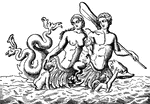
Tritons
"Triton was the son of Neptune and Amphitrite, and the poets made him his father's trumpeter. Proteus…
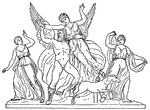
Boreas and Orithyia
"Boreas loved the nymph Orithyia, and tried to play the lover's part, but met with poor success." —Bulfinch,…

Hymen
"Hymen had been called to bless with his presence the nuptials of Orpheus with Eurydice; but though…

Amphion and Zethus
"Amphion was the son of Jupiter and Antiope, queen of Thebes. With his twin brother, Zethus he was exposed…
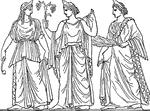
The Hours
"In the evening Aurora came, accompanied by the Hours and the Pleiades, and wept and lamented over her…
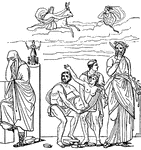
Sacrifice of Iphigenia
"When she was about to be sacrificed the goddess relented and snatched her away, leaving a hind in her…
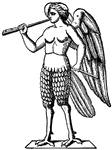
Siren
"The Sirens were sea nymphs who had the power of charming by their song all who heard them, so that…
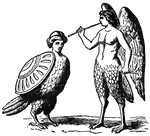
Harpies
"These were disgusting birds, with the heads of maidens, with long claws and faces pale with hunger.…
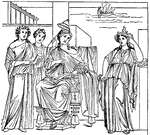
Dido parting with Aeneas
"Aeneas parted from Dido, though she tried every allurement and persuasion to detain him." —Bulfinch,…
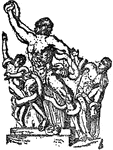
Laocoon
"In Greek legend, a priest of Apollo and Neptune, located in the city of Troy during the Trojan War.…

Lotus
A name derived from the lotus of Greek legend, and applied to various species of plants related to the…
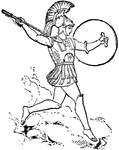
Mars
The god of war, corresponding to the Greek Ares. He was the son of Juno, and as father of Romulus was…
Chichi Border Design
The Chichi Border Design. Usually consists of an eight-petaled flower arranged on the alternate steps…
Fret and Key
Chinese Fret, Greek Fret, and Greek Key border designs. This is suggested by the overlapping of the…
Fret and Key
Chinese Fret, Greek Fret, and Greek Key border designs. This is suggested by the overlapping of the…



